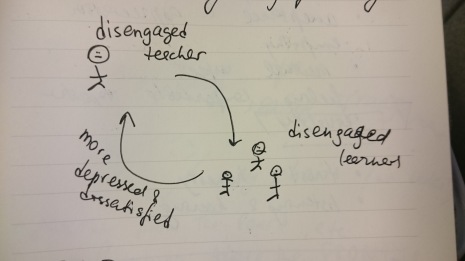Sarah Mercer and Relational Pedagogy
- Sarah Mercer feels passionate about the importance of the teacher. I feel passionate about it, too. She also says our well-being comes first. I believe in this, too.
- When we praise some students in front of the whole class, what are the implicit messages for all other students of that class?
- Sarah shared the VIA classification of character strengths and I am most thankful to her for that. For one thing, I’m glad the classification, the list already exists. And then this:
Each one of us possess all 24 of the VIA character strengths in varying degrees making up our own unique profiles.
That means all of our students possess those strengths. That said, my most challenging class this semester, which also happens to be the main subject of my journaling, gets another angle to look at. What makes each of those 8 students special? How can I build up on their particular strengths? And then we could start feeling better about our time together in class, maybe.
- Sarah shared some research which showed that teacher-student relationship is 11th out of 138 most influential factors for learning. Isn’t it quite important, then? Doesn’t it mean that we should invest in this relationship more – notice it, care about it, talk about it, work on it?…
- Then there was this idea. Just as being around positive, happy people might make you feel happier and more positive, the opposite is also true. The vicious cycle of disengagement:

And since WE are the adults in our relationships with students (well, when we are), it is up to US to take the effort to start the positive relationship. Ultimately, it is good for US as what we do, the way we do it, will travel that loop and come back amplified.
- Offer choice no matter how limited.
- What qualities are important for people in relationships? she asked us. The one that immediately came to my mind was reciprocity. Sarah’s list included that, and also appreciation, equality, empathy, mutual respect, trust, feeling comfortble together, and more… So logic suggests these same qualities should be nurtured between students and teachers, too, as ours is a social relationship just as important, as we’ve seen.
John Fanselow and iTDi
- How many people you know and/or communicate with who are NOT teachers or former students? Talk to non-educators about what is important in their jobs and lives. Take in what they say and relate.
- “I don’t consider what I do my work,” he said. I share the feeling.
- Ask your students – What would be great to have in your class and in your classroom? What could make the class better? Quite possibly they have some ideas.
- Ask them also – What annoys you about this class? And makes it a pleasant experience?
- Question everything – How is what you’re doing good? How is it not good? What are the alternative options? Along the same lines… I might think, “it’s a good idea!”… But what if it’s not?…
- And finally, this: Textbooks leave out the one important skill, which is emotional development.
There was much more about JALT, and as usual the most important and memorable was about the people. About our emotional relationships. That’s what stays for me, conference after conference, and likely class after class for our learners, too.
Thinking of all the people this past weekend… we hugged, talked, laughed, took pictures, worked in pairs in workshops, shared meals and drinks, shared plans, presented together, tweeted together, learnt together, got tired, felt ignorant and/or knowledgeable together, played games like young learners do, helped each other out… Then we were sad to said goodbye. And now we’re here, at the end of this blogpost.
If you’ve never been to a conference, I hope you do go. I hope you’ll keep an open mind and welcome connections that will flow your way, and then I hope you’ll feel the way I do.
As ever, thank you for reading.